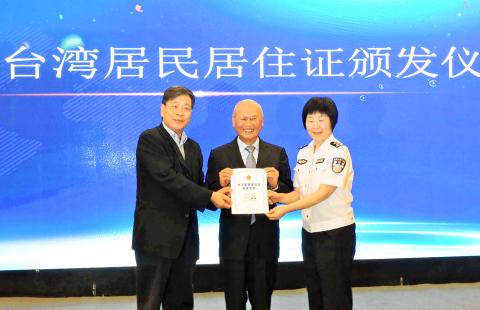The Mainland Affairs Council’s proposed measures to counter China’s new residency permit cards for Taiwanese are among the Executive Yuan’s priorities for the new legislative session, sources said yesterday.
The council is to propose draft amendments to the Act Governing Relations Between the People of the Taiwan Area and the Mainland Area (臺灣地區與大陸地區人民關係條例) that would require holders of Chinese residency cards to report to authorities, said high-ranking officials who declined to be named, adding that the council has yet to decide whether to bar cardholders from holding public office or national security-related positions.
The draft amendments are to be proposed as a priority bill for the legislative session that begins tomorrow, alongside 41 other priority bills, the officials said.

Photo: CNA, courtesy of a reader
Premier William Lai (賴清德) is scheduled to hold a briefing with Democratic Progressive Party (DPP) legislators today to discuss bills that should be prioritized in the new session.
The act needs to be amended because China’s residency card is designed to evade provisions in the act that bans Taiwanese from simultaneously holding household registrations in Taiwan and China, officials said, adding that China treats residency cardholders as Chinese citizens, although they do not hold household registrations.
The policy is a “united front” ploy and a threat to national security, they said.
The Chinese State Council Information Office on Aug. 16 announced that, starting on Sept. 1, Taiwanese, Hong Kongers and Macanese who have lived in China for more than six months and are legally working, living or studying in the nation would be eligible to apply for a residence card.
Cardholders are granted certain rights and benefits enjoyed by Chinese citizens, such as compulsory education, social insurance and housing subsidies.
DPP Legislator Wang Ting-yu (王定宇) had said he would propose an amendment that would cancel cardholders’ household registration in Taiwan, but officials said they would discuss the bill first with legislators.
The council currently has no plan to cancel cardholders’ household registration, but that does not mean it never will, they added.
Other national security-related priority bills for the session include amendments to the act to regulate illegal investment activities by Chinese nationals in Taiwan, and to ban high-ranking government officials and retired military officers from attending political events in China for 15 years after their retirement, as well as draft amendments to the Classified National Security Information Protection Act (國家機密保護法), they said.
Also included are the general budget plan for next year and more than 20 economy-related bills, such as draft amendments to the Securities and Exchange Act (證券交易法), the Urban Renewal Act (都市更新條例), the Futures Trading Act (期貨交易法) and the Trademark Act (商標法), they added.

SECURITY: As China is ‘reshaping’ Hong Kong’s population, Taiwan must raise the eligibility threshold for applications from Hong Kongers, Chiu Chui-cheng said When Hong Kong and Macau citizens apply for residency in Taiwan, it would be under a new category that includes a “national security observation period,” Mainland Affairs Council (MAC) Minister Chiu Chui-cheng (邱垂正) said yesterday. President William Lai (賴清德) on March 13 announced 17 strategies to counter China’s aggression toward Taiwan, including incorporating national security considerations into the review process for residency applications from Hong Kong and Macau citizens. The situation in Hong Kong is constantly changing, Chiu said to media yesterday on the sidelines of the Taipei Technology Run hosted by the Taipei Neihu Technology Park Development Association. With

CARROT AND STICK: While unrelenting in its military threats, China attracted nearly 40,000 Taiwanese to over 400 business events last year Nearly 40,000 Taiwanese last year joined industry events in China, such as conferences and trade fairs, supported by the Chinese government, a study showed yesterday, as Beijing ramps up a charm offensive toward Taipei alongside military pressure. China has long taken a carrot-and-stick approach to Taiwan, threatening it with the prospect of military action while reaching out to those it believes are amenable to Beijing’s point of view. Taiwanese security officials are wary of what they see as Beijing’s influence campaigns to sway public opinion after Taipei and Beijing gradually resumed travel links halted by the COVID-19 pandemic, but the scale of

A US Marine Corps regiment equipped with Naval Strike Missiles (NSM) is set to participate in the upcoming Balikatan 25 exercise in the Luzon Strait, marking the system’s first-ever deployment in the Philippines. US and Philippine officials have separately confirmed that the Navy Marine Expeditionary Ship Interdiction System (NMESIS) — the mobile launch platform for the Naval Strike Missile — would take part in the joint exercise. The missiles are being deployed to “a strategic first island chain chokepoint” in the waters between Taiwan proper and the Philippines, US-based Naval News reported. “The Luzon Strait and Bashi Channel represent a critical access

Pope Francis is be laid to rest on Saturday after lying in state for three days in St Peter’s Basilica, where the faithful are expected to flock to pay their respects to history’s first Latin American pontiff. The cardinals met yesterday in the Vatican’s synod hall to chart the next steps before a conclave begins to choose Francis’ successor, as condolences poured in from around the world. According to current norms, the conclave must begin between May 5 and 10. The cardinals set the funeral for Saturday at 10am in St Peter’s Square, to be celebrated by the dean of the College